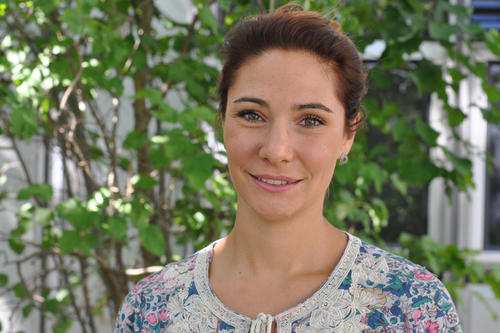When Facebook Makes People Happy
Psychologist Anna Metzler studies the behavior of children and teens on the social network Facebook
Nov 10, 2014
Psychologist Anna Metzler aims to combine research and her work as a therapist for children and teens.
Image Credit: Jan Hambura
Abbreviations like “LOL” and “HDL” (for hab’ dich lieb, or “love ya”) and the Like button – all of them are things that Anna Metzler has seen for several hours a day recently. Metzler, a psychologist, is doing research on the behavior of teens and young people on the social network for her dissertation at Freie Universität Berlin under the working title You and Facebook, and that includes using Internet jargon and abbreviations like LOL (“laughing out loud”) and HDL.
Metzler got the idea for her dissertation topic during her previous work as a child and teen psychotherapist. “The kids often told me about what their friends had written or posted on Facebook,” Metzler explains.
The social network has now become an important part of life for children and teens, she says. “I even use it myself,” she adds. Even before finishing her degree in psychology at the University of Mannheim, Metzler planned to work in an academic setting later on.
After completing her training as a child and teen psychotherapist focusing on behavioral therapy, she presented her dissertation plans to Herbert Scheithauer, a professor of developmental science and applied developmental psychology at Freie Universität. Now, since April 2013, Metzler has been doing research on the topic under his supervision, with an Elsa Neumann scholarship from the state of Berlin. “In the future, I’d like to combine my academic work with therapeutic practice,” she says
Metzler is currently researching how children and teens present themselves in the “exciting medium of Facebook.” She is studying the extent to which the self-concepts of her subjects are reflected in the virtual network. “Self-concepts” is a term used to encompass various traits, such as physical skills and abilities or physical attractiveness.
In the long term, the goal of the study is to shed light on how self-depictions on Facebook affect the development of identity and self-worth among children and adolescents. “Take a boy named Peter, for example, who considers himself athletic,” Metzler says. “Consequently, he would also have to demonstrate that on Facebook.” That could take the form of things like uploading photos of his soccer team. “And extroverted children and teens would have to be the same way in the virtual world, for example by uploading a lot of pictures of themselves.”.
But what kinds of consequences can these actions have for adolescents and children? “The line of inquiry in my research is whether this has positive or negative effects on their sense of self-worth,” Metzler says. Her results indicate that the consequences are positive. For example, she says children and teens who present an honest picture of themselves online are happier than their peers who present a distorted view. One possible explanation is that considering their own profiles boosts self-esteem, “because you see yourself in a social context,” she says.
Facebook Can Help Overcome Shynes
Other studies of chat rooms and online discussion forums have already found that “faking” behavior, meaning presenting a distorted or inauthentic view of oneself online, has negative effects on people. “At the same time, though, there are also studies that show that self-depictions on Facebook by adults have no effect on their sense of self-worth.”
One possible explanation, according to Metzler is that “social comparison is highly important to children and teens in particular.” Comparing themselves with their peers might also help these groups to identify what is appropriate and what kinds of things are fun, and Facebook users also receive feedback from other users right away.
On the whole, Metzler says, the social platform has many positive effects for various people. For example, it offers a place where people can compensate for shyness or social awkwardness in real life. “Things like excessive sweating or having a shaky voice are not even a factor in getting to know people on the Internet,” Metzler says
Metzler’s study is a longitudinal study, which investigates developmental trends over a longer period. The psychologist is not only interviewing children and teens via online surveys, but also taking a detailed view of the Facebook profiles of study participants who have given their consent beforehand. The first survey conducted as part of the study ran from September 2013 to January of this year. About 700 teens between the ages of 14 and 18 participated.
“I spread the information about the study widely on the Internet,” explains Metzler. The subjects spent about 20 to 30 minutes answering a wide range of questions. Then, as the next step, Metzler observes the profiles of 140 young people on Facebook. They have “friended” her there, meaning that the researcher can see the images and messages that the young users post online for their Facebook “friends.”
Thanks to a statement of consent by the research subjects, she is even allowed to take screenshots of their Facebook profiles and posts. In the process, Metzler found that participants had a growing awareness of issues of privacy and data protection. “Many of them asked me who would see all of this.” To set the subjects’ minds at ease, the researcher focuses a great deal on privacy. “Photos and other elements of user profiles will never be publicly visible,” Metzler says.
The second online survey in the longitudinal study started in September of this year. It is identical to the first one, and it is being filled out by the children and teens who had already participated in the first round and stated that they wished to participate in the second wave of data collection a year later. “I’m already really looking forward to the results,” Metzler says.
Further Information
Anna Metzler, Division of Developmental Science and Applied Developmental Psychology, Department of Education and Psychology, Freie Universität Berlin, Tel.: +49 30 838-54 793, Email: annarehm(at)zedat.fu-berlin.de

